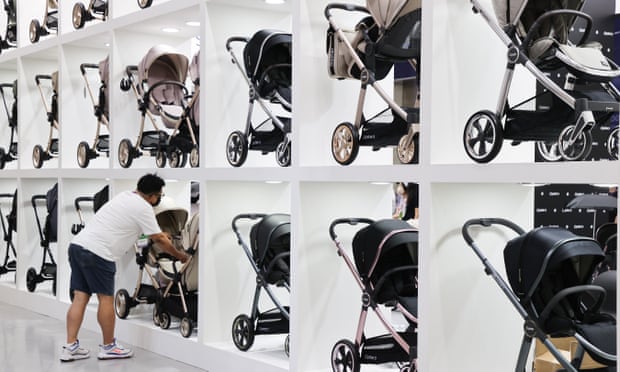 |
| South Korea’s birth rate has fallen to its lowest level since records were first kept in 1970 |
Latest statistics show 249,000 babies were born in 2022, a fall of 4.4% from the previous year
Justin McCurry in TokyoWed 22 Feb 2023
South Korea’s demographic crisis has deepened after new data showed the number of babies born last year reached another record low.
According to figures released on Wednesday by Statistics Korea, 249,000 babies were born in 2022, a fall of 4.4% from the previous year and the third year in a row that deaths have exceeded births in Asia’s fourth-biggest economy.
The birthrate also dropped to a record low, dealing a blow to government efforts to encourage couples to have more children.
A South Korean woman can now expect to have an average of 0.78 children in her lifetime – the lowest level since records were first kept in 1970 – making South Korea the only country in the world with a fertility rate below one.
Experts say the rate needs to be at least 2.1 to keep the country’s populationstable at 52 million.
It is not the only country battling declining birthrates – Japan’s government recently warned that population decline was taking the country “to the brink of social dysfunction” – but the trend in South Korea is particularly alarming for policymakers.
More young people are choosing to delay starting families or giving up on having children altogether.
They cite the high cost of raising children, poor job prospects amid an economic slowdown, and rising real estate prices, while some women say they prefer to prioritise their personal freedom and have ruled out finding a marriage partner.
As a result, the number of marriages in South Korea reached an all-time low of 193,000 in 2021.
The average age at which women give birth was 33.5 in 2022, according to the new data, up 0.2 from a year earlier. On average, women gave birth to their first child at 33. Just 24 babies were born for every 1,000 women in their late 20s – down 3.5% from a year earlier – the Yonhap news agency reported.
With the world’s lowest fertility rate and a rapidly ageing population, concern is growing about the strain on South Korea’s economy and the pension system, which may become depleted in the coming decades.
The population shrank for the first time on record in 2021, and is projected to fall further, to 38 million, by 2070.
Like Japan, local governments in South Korea have launched programmes to encourage people to have children, including cash handouts and help with fertility treatment and medical expenses – measures experts say fail to properly address sky-high living costs and changing attitudes towards gender roles and work-life balance.
In December, the South Korean government unveiled a package of measures to address the low birthrate and ageing population, including shortening career breaks for women after they have children, more affordable housing and better job opportunities for young people. The unemployment rate among people aged 25 to 29 reached 5.6% in January, higher than the national average of 3.6%.
The government of president Yoon Suk-yeol is offering 700,000 won ($540) a month to families with a child aged under a year old, with the payment set to rise to 1m won starting next year, the Nikkei business newspaper said.
The government has also said it will seek to loosen restrictions on migrant labour to tackle population decline, an idea opposed by many conservative South Koreans.
No comments:
Post a Comment